|
|
|
Sort Order |
|
|
|
Items / Page
|
|
|
|
|
|
|
| Srl | Item |
| 1 |
ID:
113155
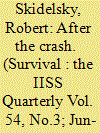

|
|
|
|
|
| Publication |
2012.
|
| Summary/Abstract |
Since its collapse in autumn 2008, the world economy has gone through three phases: a year or more of rapid decline; a bounce back in 2009-10, which nevertheless did not amount to a full recovery; and a second, though so far much shallower, downturn in the developed world over the last year.
|
|
|
|
|
|
|
|
|
|
|
|
|
|
|
|
| 2 |
ID:
113160
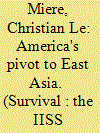

|
|
|
|
|
| Publication |
2012.
|
| Summary/Abstract |
The announcement of a reformed US defence strategy by President Barack Obama and Secretary of Defense Leon Panetta in early January 2012 confirmed a pivot towards the Asia-Pacific as commitments to war fighting in the Middle East and Central Asia subside. Obama, Panetta and General Martin Dempsey, the chairman of the Joint Chiefs of Staff, briefed reporters on 5 January on America's new strategic guidance document, 'Sustaining US Leadership: Priorities for 21st Century Defense'. The product of a review of US defence priorities 'at a moment of transition' for the nation, the document notes that the United States will 'of necessity rebalance toward the Asia-Pacific region'. The principle of the Asia pivot was also signalled by Secretary of State Hillary Clinton in a November 2011 Foreign Policy article in which she noted that 'one of the most important tasks of American statecraft over the next decade will … be to lock in a substantially increased investment - diplomatic, economic, strategic, and otherwise - in the Asia-Pacific region'.
|
|
|
|
|
|
|
|
|
|
|
|
|
|
|
|
| 3 |
ID:
113158
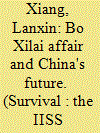

|
|
|
|
|
| Publication |
2012.
|
| Summary/Abstract |
Money, sex, murder, conspiracy: the Bo Xilai affair has all the makings of a political thriller. But there is nothing fictional about the reality show currently unfolding before the eyes of 1.3 billion people in China. The significance of this drama for China's future should not be underestimated. International media coverage ofthe affair has missed a crucial point: scandalous as it may be, Bo's downfall may have opened a window of opportunity for reform-minded Chinese leaders to build consensus for launching serious political reforms. Bo himself is facing accusations of corruption, at least for now, but the real issue goes beyond the need to crack down on corruption among party officials, which is so widespread that the very foundation of the Communist Party's rule is threatened.
|
|
|
|
|
|
|
|
|
|
|
|
|
|
|
|
| 4 |
ID:
113162
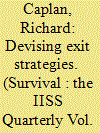

|
|
|
|
|
| Publication |
2012.
|
| Summary/Abstract |
'Before we send our troops into a foreign country, we should know how and when we're going to get them out', US National Security Adviser Anthony Lake intoned in 1996, two years after the precipitate withdrawal of US forces from Somalia. Yet rarely has this requirement been met. Planning for exit as precisely as Lake's comments would suggest is difficult if not impossible, as the Clinton administration would discover in Bosnia and Herzegovina only months later. No one can foresee the circumstances that will obtain, and the course adjustments they may necessitate, once an operation has been launched. But this is not to say that more informed planning for exit is not possible. Not only has the subject of exit strategies received comparatively little sustained scholarly attention; it is also fair to say that policy in this area has been more ad hoc than carefully thought out.
|
|
|
|
|
|
|
|
|
|
|
|
|
|
|
|
| 5 |
ID:
113156


|
|
|
|
|
| Publication |
2012.
|
| Summary/Abstract |
During the five years from 2003 to 2007, global perceptions of risk were unusually low, as reflected in the market pricing of sovereign debt, corporate debt and options. These perceptions were wrong, as the ensuing five years have abundantly illustrated. Today, in 2012, nobody doubts that the world faces many serious economic and political risks
|
|
|
|
|
|
|
|
|
|
|
|
|
|
|
|
| 6 |
ID:
113157
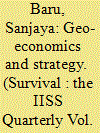

|
|
|
|
|
| Publication |
2012.
|
| Summary/Abstract |
Geo-economics may be defined in two different ways: as the relationship between economic policy and changes in national power and geopolitics (in other words, the geopolitical consequences of economic phenomena); or as the economic consequences of trends in geopolitics and national power. Both the notion that 'trade follows the flag' (that the projection of national power has economic consequences) and that 'the flag follows trade' (that there are geopolitical consequences of essentially economic phenomena) point to the subject matter of geo-economics.
|
|
|
|
|
|
|
|
|
|
|
|
|
|
|
|
| 7 |
ID:
113161


|
|
|
|
|
| Publication |
2012.
|
| Summary/Abstract |
Even by the standards of international institutions, the North Atlantic Treaty Organisation (NATO) is peculiarly polymorphic. In part, this is due to the diverse membership of 28 sovereign states that bring different histories, perspectives and agendas to the NATO Council table. But, on a deeper level, it is also the consequence of political design and the institution's structure. The purpose of the Alliance is to guarantee the security of its member states. Since the nature and urgency of threats are constantly changing, so must the Alliance. For NATO, just to exist is not enough. It cannot be a status quo institution and an effective Alliance at the same time. If NATO were to focus only on already-identified challenges to members' security, it might fail to recognise new and different challenges and would adapt to them too late, or not at all.
|
|
|
|
|
|
|
|
|
|
|
|
|
|
|
|
| 8 |
ID:
113163
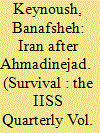

|
|
|
|
|
| Publication |
2012.
|
| Summary/Abstract |
Power struggles and political fragmentation have been endemic to the Islamic Republic of Iran since its founding in 1979. But although internal division may weaken the state, it is unlikely to break it. The multiple pillars of power in the Iranian republic protect it from sudden collapse. Loyalties can easily shift from one pillar to the next, allowing for the emergence of new political identities. Elections in particular - there have been 28 since the 1979 revolution - are a significant catalyst for such changes.
|
|
|
|
|
|
|
|
|
|
|
|
|
|
|
|
| 9 |
ID:
113164
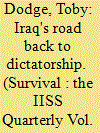

|
|
|
|
|
| Publication |
2012.
|
| Summary/Abstract |
On 15 December 2011, in a fortified compound at Baghdad International Airport, US Secretary of Defense Leon Panetta oversaw the formal end of America's military presence in Iraq. The event marked the final departure of US troops, eight years and nine months after the invasion. Panetta's farewell speech was sober and downbeat. He placed a great deal of emphasis on the sacrifices that Iraqis and Americans had made. However, given that the George W. Bush administration had placed the political and economic transformation of Iraq at the centre of its war aims, Panetta's description of what the mission had ultimately achieved was decidedly modest. Iraq, he said, could now govern and secure itself … the Iraqi army and police have been rebuilt and they are capable of responding to threats; violence levels are down; al Qaeda has been weakened; the rule of law has been strengthened; educational opportunities have been expanded; and economic growth is expanding.
|
|
|
|
|
|
|
|
|
|
|
|
|
|
|
|
| 10 |
ID:
113159
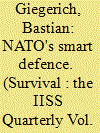

|
|
|
|
|
| Publication |
2012.
|
| Summary/Abstract |
At the 2012 NATO Summit in Chicago, Secretary-General Anders Fogh Rasmussen's 'smart defence' initiative will be a core agenda item. Rasmussen has argued that Allies need to cooperate more, and more flexibly, to prevent a deterioration in NATO's collective capability in the face of the three-pronged challenge of budget austerity, ongoing operational challenges, and a security environment characterised by deep strategic uncertainty. As he put it at the 2012 Munich Security Conference, the political initiative would amount to 'a new way for NATO and Allies to do business … this is about doing more by doing it together'. In Chicago, the Alliance was expected to agree on a political declaration providing the conceptual basis for smart defence, and to present some two-dozen multinational projects to mark the start of the initiative.
|
|
|
|
|
|
|
|
|
|
|
|
|
|
|
|
|
|
|
|
|